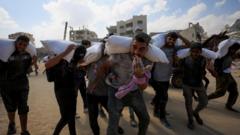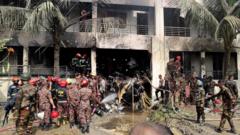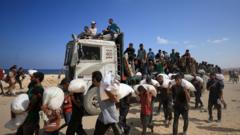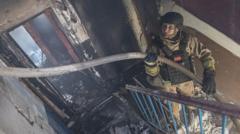Two deadly shootings over the weekend highlight the risks faced by civilians in Gaza, as tensions mount around aid distribution methods amid the Israeli blockade.
Dangers Loom as Aid Distribution in Gaza Escalates Tensions

Dangers Loom as Aid Distribution in Gaza Escalates Tensions
Recent incidents in Gaza reveal the complexities and dangers associated with the distribution of humanitarian aid amid ongoing conflict.
Over the past weekend, two tragic events spotlighted the perils of aid distribution in Gaza, where overlapping methods—one supported by Israel and the other facilitated by the U.N.—are exposing Palestinian civilians to significant dangers. On Saturday, Israeli soldiers shot at locals near a food distribution site operated by Israel-backed contractors, followed by another incident on Sunday where troops opened fire on individuals gathering near a U.N. convoy delivering food aid to Hamas-controlled areas.
These incidents have ignited a heated debate, with advocates of the Israel-backed food distribution method pointing to the Sunday shooting as evidence of the U.N. system's failures. Conversely, supporters of the U.N. strategy argue that the Saturday event illustrates the risks inherent in the Israeli approach. Israel contends that placing distribution centers outside Hamas's jurisdiction is essential to prevent both theft by fighters and looters. Critics argue this method forces civilians into perilous situations, navigating Israeli military zones in search of food.
Three significant issues underscore the complications surrounding the distribution of aid. Firstly, the Israeli military employed live ammunition to control crowds in both situations instead of utilizing non-lethal crowd management techniques. Secondly, Palestinian civilians are increasingly willing to risk their lives to secure food amid an acute scarcity exacerbated by an 80-day Israeli blockade earlier this year. Lastly, the absence of a functional governing authority in most of Gaza, owing to a dismantled Hamas leadership and destroyed municipal structures, has resulted in a state of anarchy, complicating any viable aid delivery system.
Shira Efron, an expert on Gaza aid systems at the Israel Policy Forum, commented, “There’s a blame game and everyone is looking at the technical details and about how the aid is distributed. The bigger issue is the lawlessness and the breakdown of governance.” She further emphasized that without addressing Gaza's broader governance crisis, the cycle of violence and humanitarian disaster is unlikely to end.
In response to such criticisms, Israeli Prime Minister Benjamin Netanyahu has maintained that Hamas must face total defeat prior to the establishment of any definitive post-war governance strategies. Nevertheless, critics from across the political spectrum argue that the absence of a clear plan for what follows Hamas's defeat will only hinder any efforts to bring lasting stability to the region.
These incidents have ignited a heated debate, with advocates of the Israel-backed food distribution method pointing to the Sunday shooting as evidence of the U.N. system's failures. Conversely, supporters of the U.N. strategy argue that the Saturday event illustrates the risks inherent in the Israeli approach. Israel contends that placing distribution centers outside Hamas's jurisdiction is essential to prevent both theft by fighters and looters. Critics argue this method forces civilians into perilous situations, navigating Israeli military zones in search of food.
Three significant issues underscore the complications surrounding the distribution of aid. Firstly, the Israeli military employed live ammunition to control crowds in both situations instead of utilizing non-lethal crowd management techniques. Secondly, Palestinian civilians are increasingly willing to risk their lives to secure food amid an acute scarcity exacerbated by an 80-day Israeli blockade earlier this year. Lastly, the absence of a functional governing authority in most of Gaza, owing to a dismantled Hamas leadership and destroyed municipal structures, has resulted in a state of anarchy, complicating any viable aid delivery system.
Shira Efron, an expert on Gaza aid systems at the Israel Policy Forum, commented, “There’s a blame game and everyone is looking at the technical details and about how the aid is distributed. The bigger issue is the lawlessness and the breakdown of governance.” She further emphasized that without addressing Gaza's broader governance crisis, the cycle of violence and humanitarian disaster is unlikely to end.
In response to such criticisms, Israeli Prime Minister Benjamin Netanyahu has maintained that Hamas must face total defeat prior to the establishment of any definitive post-war governance strategies. Nevertheless, critics from across the political spectrum argue that the absence of a clear plan for what follows Hamas's defeat will only hinder any efforts to bring lasting stability to the region.





















